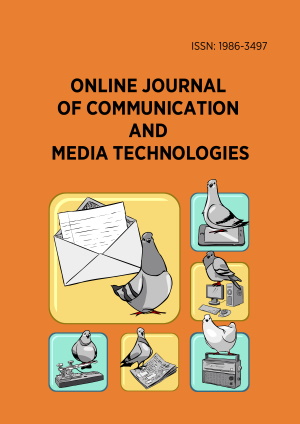Research Article
A Meta Analysis Study for Graduate Thesis on Media Literacy in Turkey
More Detail
1 Akdeniz University, Antalya, TURKEY2 Aydın Adnan Menderes University, Aydın, TURKEY* Corresponding Author
Online Journal of Communication and Media Technologies, 11(4), October 2021, e202121, https://doi.org/10.30935/ojcmt/11211
OPEN ACCESS 3288 Views 3378 Downloads
ABSTRACT
Media literacy includes the ability to access media messages in various contexts and formats, to be equipped to receive and detect these messages correctly and ultimately to produce new messages. It is a concept that gives the control power over the masses and makes border between the real world and the world created by the media. Media literacy has often been subject to scientific studies in higher education, especially in the fields of communication and education. This study aims to identify the general academic tendencies and approaches in the field of media literacy by examining the postgraduate theses written to the present day with the method of meta-analysis. It has been observed that the number of theses which have been written about this subject has been continuously increasing for about 13 years. In this article it is aimed to determine which research methods have been used in the theses written, what were the research focuses and their ideological orientations. In addition, the article contains current data about media literacy. This study, which analyzes all the theses written about media literacy until 2020, aims to contribute to the relevant literature by means of analyzing the nature of the postgraduate theses.
CITATION (APA)
Arik, E., & Arik, M. B. (2021). A Meta Analysis Study for Graduate Thesis on Media Literacy in Turkey. Online Journal of Communication and Media Technologies, 11(4), e202121. https://doi.org/10.30935/ojcmt/11211
REFERENCES
- Arslan-Cansever, B. (2019). Investigation of third grade students’ views on media literacy. International Journal of Educational Methodology, 5(2), 265-273. https://doi.org/10.12973/ijem.5.1.265
- Aufderheide, P. (1989). Media literacy: resource guide. Ministry of Education.
- Aufderheide, P. (1993). National leadership conference on media literacy. Conference report. Aspen Institute.
- Bostancı, N. (2007). İlköğretim medya okuryazarlığı dersi öğretmen kitabı [Primary school media literacy lesson teacher’s book]. Ministry of National Education Publishing.
- Bostancı, N. (2018) İlköğretim medya okuryazarlığı dersi öğretim programı ve kılavuzu [Primary education media literacy course curriculum and guide]. Ministry of National Education Publishing.
- Buckingam, D. (2009). Media education literacy learning and contemporary culture. Polity Press.
- Buckingham, D. (1993). Children Talking Television: The making of television literacy. The Falmer Press.
- Buckingham, D. (2015). The future of media literacy in the digital age: some challenges for policy and practice, Medienimpulse, Ausgabe, 47(2), 1-18. https://doi.org/10.21243/mi-02-09-13
- Bulger, M., & Davison, P. (2018). The promises, challenges, and futures of media literacy. Journal of Media Literacy Education, 10(1), 1-21. https://doi.org/10.23860/JMLE-2018-10-1-1
- Ciurel, D. (2016). Media literacy: concepts, approaches and competencies. Professional Communication and Translation Studies, 8(9), 13-20.
- Cohen, L., & Manion, L (2001). Research methods in education. Routledge Falmer. https://doi.org/10.4324/9780203224342
- Durlak, J. A. (1995). Understanding meta-analysis. In L. G. Grimm, & P. R. Yarnold (Eds.), Reading and understanding multivariate statistics, American Psychological Association.
- French, D., & Richard, M. (2003). Media education across Europe. Taylor & Francis e-Library. https://doi.org/10.4324/9780203204801
- Gaines, E. (2010). Media literacy and semiotics. Palgrave Macmillan. https://doi.org/10.1057/9780230115514
- Gu, X., Wang, C., & Lin (2019). Examining scientific literacy through new media. EURASIA Journal of Mathematics, Science and Technology Education, 15(12), 1-14. https://doi.org/10.29333/ejmste/109948
- Hobbs, R. (1998). The seven great debates in the media literacy movement. Journal of Communication, 48(1), 16-32, https://doi.org/10.1111/j.1460-2466.1998.tb02734.x
- İçen, M. (2020). Developing media literacy through activities. International Journal of Educational Methodology, 6(3), 631-642. https://doi.org/10.12973/ijem.6.3.631
- Kamerer, D. (2013). Media literacy, communication research trends. Routledge Falmer.
- Kellner, D. (2001). New Technologies/New Literacies: Reconstructing education for the new millennium, International Journal of Technology and Design Education 11(1), 67-81. https://doi.org/10.1023/A:1011270402858
- Potter, J. W. (2013). Media literacy. Sage Publications.
- Potter, W. J (2004). Theory of media literacy, a cognitive approach. Sage Publications. https://doi.org/10.4135/9781483328881
- Rogow, F. (2015). Media literacy in early childhood education: inquiry-based technology integration. In C. Donohue (Ed.), Technology and digital media in the early years: Tools for teaching and learning. Routledge.
- Turow, J. (2003). Media today. Houghten Mifflin Company.
- Türkoğlu, N. (Ed.) (2006). I. Uluslararası Medya Okuryazarlığı Konferansı bildiri kitabı [Proceedings of the I. International Media Literacy Conference]. Marmara University Faculty of Communication Publishing.
- Valtonen, T., Tedre, M., & Vartiainen, H. (2019). Media literacy education in the age of machine learning. Journal of Media Literacy Education, 11(2), 20-36. https://doi.org/10.23860/JMLE-2019-11-2-2

 The articles published in this journal are licensed under the CC-BY Creative Commons Attribution International License.
The articles published in this journal are licensed under the CC-BY Creative Commons Attribution International License.